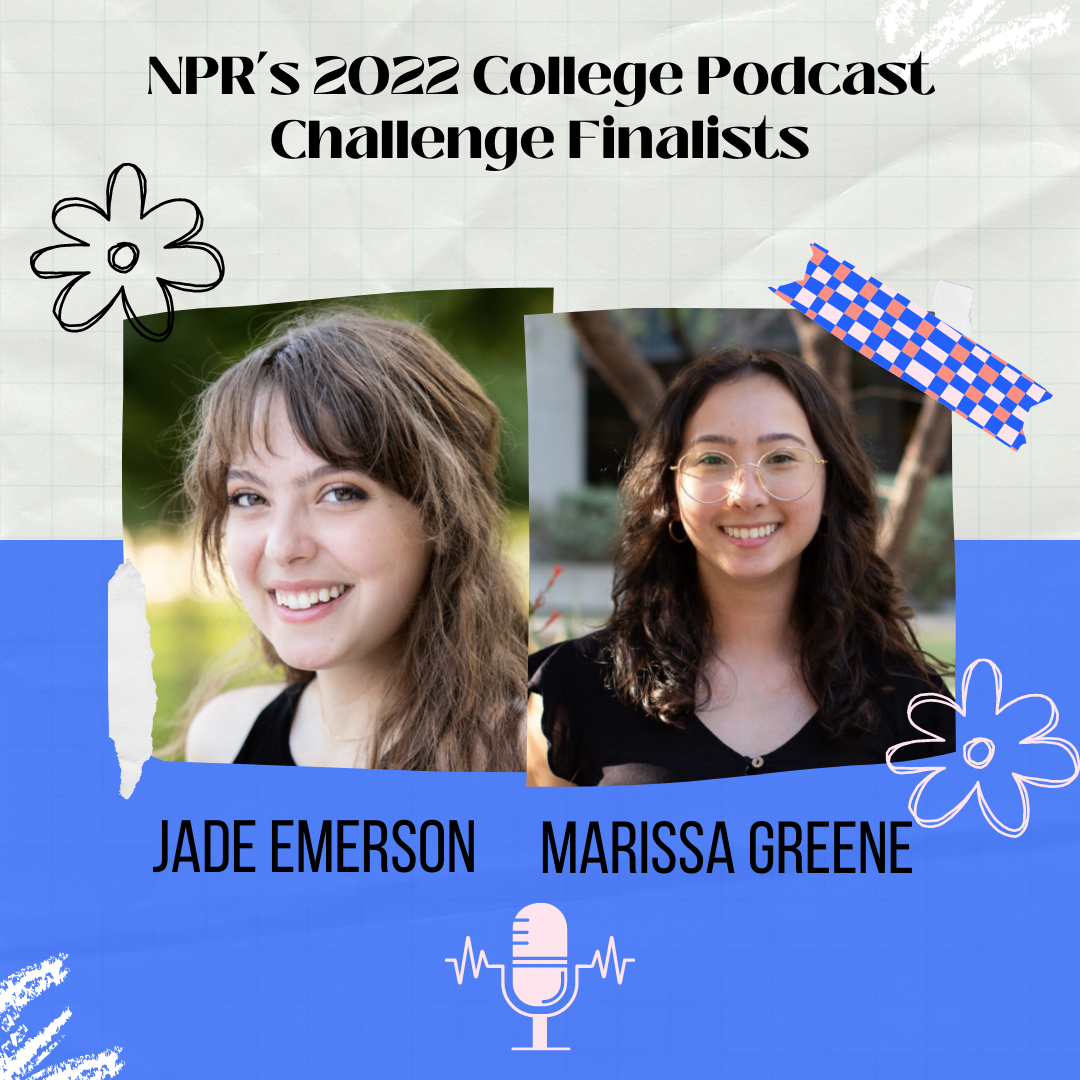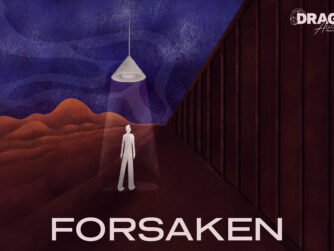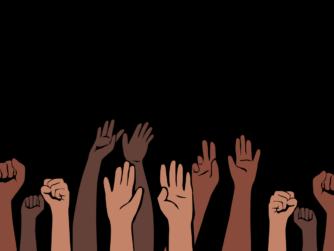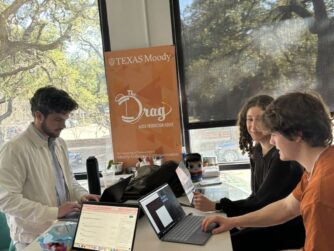NPR launched a college podcast challenge that individually landed two Moody College of Communication students, and staff members of The Drag, a spot as top 10 finalists.
Marissa Greene, journalism junior, is one of two finalists from UT with the submission of her podcast “Meet Mariachi Paredes.” Greene’s story covers the UT Austin’s mariachi ensemble and the connective culture that it creates in Latin communities and beyond. For her personally, working on the podcast led her to discover quirks about her past loved ones, which she felt brought her closer to them.
Journalism junior Jade Emerson is also a finalist with her podcast “Farewell to Dry Creek Bar and Cafe,” which tells an often too familiar story of having to bid adieu to local gems in Austin, Texas, while honoring the impact the establishment had on the community. The podcast project is the first audio storytelling she has ever worked on.
We spoke to Marissa and Jade, who both happen to be recent UT Austin transfer students, in a Q&A to hear more about themselves, what being a finalist in the contest means to them, and what is to come.
Q: You are a top 10 finalist for NPR’s College Podcast Challenge. How did you find out about the competition, and what led you to apply?
Marissa: I remember Professor Quigley mentioning the NPR podcast challenge opportunity during one of our staff meetings, and I was really interested in it at the time. I wanted to put in everything that I learned from my classes and my experience at The Drag into a test and see what I could come up with. As the deadline started getting closer, I was starting to get more nervous and experienced some imposter syndrome. I was really questioning and doubting myself ’cause I was like, “Oh, these are going to be people from NPR. Is my story good enough? Is what I have good enough for professional journalists at NPR?” It took a nudge and some encouraging words from my partner to really just press the submit button and close my laptop and say I did it.
Jade: It was a class project for Professor Quigley’s. I took his freshman intro to journalism classes, Digital Storytelling Basics, and we were tasked with creating a three minute audio story. This is what I came up with. I found out about the competition in December of last year, and I was excited about the opportunity. But really, what led me to apply was just I wasn’t quite ready to let go of this story yet. I had such a great experience working on it. The NPR contest has kind of presented a chance for me to hold on to this story a little bit more. I never expected to be a finalist, but just knowing that other people are going to hear this story and get to learn about the story of Dry Creek just means so much to me.
Q: Out the 10 finalists, 2 are UT Austin students. What does it mean to have UT students represented in this group of finalists?
Marissa: The fact that two of the 10 are Moody Students really speaks not only on behalf of the determination, commitment and dedication behind the students, but also our educators and the opportunities we have here at Moody. It also speaks on how encouraging we are on each other. Especially at The Drag, we all care for each other and it feels welcoming. We also just want to see each other learn and grow, which is what I think I really like about The Drag. I transferred from Austin Community College to UT last fall to get my bachelors, and I also wanted more opportunities and room to grow. I feel like, not only Moody, but The Drag really provided that for me. I am really grateful for everything that I have been privileged with, like these resources and professors.
Jade: It’s just so awesome getting able to experience this with Marissa. We both transferred to UT at the same time. We are both juniors. We’re both working at The Drag and we’re both learning to be audio journalists. It’s just so cool to be able to celebrate together. To have UT students represented in this group of finalists, I mean, on a personal note, my path to UT was a little unconventional. I took a gap year after high school. I went to community college for a year during the pandemic and then I transferred to UT. It’s so awesome to be here and to be able to represent UT in this way. It’s reaffirming, in a sense, for me that I made the right choice. This is where I was meant to be. This is what’s supposed to happen. The journalism school is just incredible. I’m astounded by our professors and the programs and the things I’m learning and getting to do, and this is part of that. I don’t think if I wasn’t at UT I would have found audio journalism and been able to do projects like this and then be selected as a finalist. I think it’s a big testament to the audio journalism program that’s been built at UT and that it’s led by a lot of people. But I think at the threshold of that is Professor Quigley and Katey Outka.
Q: What is one key takeaway you would want listeners to grasp onto after listening to your podcast?
Marissa: I feel like one of the biggest things that stood out to me while producing the story was whenever I was interviewing the students who were a part of the mariachi ensemble, one of them mentioned that not a lot of people know that there is a mariachi band here at UT. I found that really shocking, because this ensemble has been around and was established in 1977. It’s been 45 years that this mariachi ensemble has existed here … I just want to bring awareness to this space, but also amplify the students’ voices on how important it was to have a mariachi ensemble just here at UT.
Jade: The story is about this woman, Sarah Ransome, who ran the bar for years and was known kind of as the meanest woman in Austin, was also raising her children and her grandchildren while running the bar. The majority of the sources that I talked to were her grandchildren and her son. To get to experience this place through their eyes as well and the memories they’ve had at this place, was just incredible. Most of the family came back to Dry Creek to experience this goodbye, and to sort of be a part of that was incredible. I also fell in love with this place. I got to know and admire this woman simply through her stories … It took on its own meaning for me in seeing the meaning that it had for each of them.
Q: What is next for you? What are your goals and ambitions, even if it is not in the podcasting space?
Marissa: I’ll be a senior here this upcoming fall semester, which is really exciting and really nerve-wracking all at the same time. I’m really grateful that I’ll be continuing with The Drag and helping them produce amazing podcasts. Since this is my last year here, it’s really been a big goal of mine to really challenge myself in my journalistic abilities. I also want to be someone who can really motivate and encourage other undergraduate journalism students to try new things or to see what they’re capable of. I think that’s what I learned through this experience: to not let the imposter syndrome get to you, and just go for it. I want to be able to help other students who may be struggling or maybe dealing with imposter syndrome like I was. And, you know, tell them to just do it, you know? You never know what might come out of it.
Jade: For the past couple of months I’ve since fallen in love with audio. It’s something I’ve wanted to pursue and I have been working with The Drag on a podcast about Lady Bird Johnson, who is the former first lady of the United States and wife of Lyndon B. Johnson. We’re running to tell her entire story from her birth, to her job, and everything that came in between. We’re partnering with the LBJ Foundation and I’ve been crazy busy working on that. It’s a really good type of busy for me. It’s been a fantastic experience and I can go on and on about it. I’m excited to keep learning more about audio and keep absorbing as much as I can being around all these fantastic resources, professors, and peers. I want to keep telling stories, and we’ll see what happens after that.
For more on the NPR College Podcast challenge, click here.









